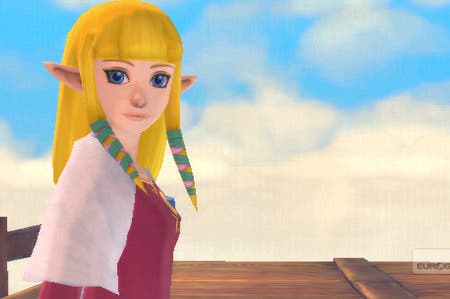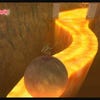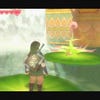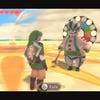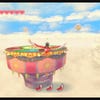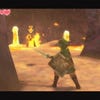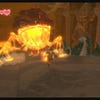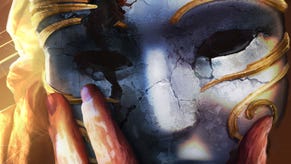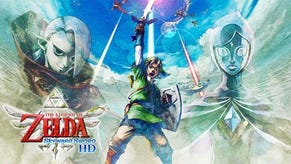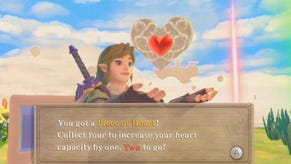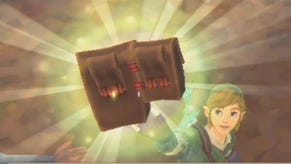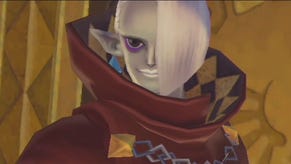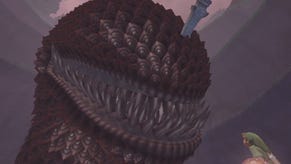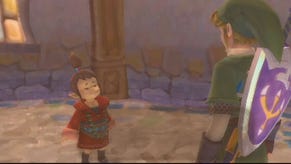Games of 2011: The Legend of Zelda: Skyward Sword
The toast of Christmas past.
So what's your favourite Christmas game? One you played at yuletide, rather than actually based on the festive season, that is. You have one, naturally. All gamers do.
The reasons are clear enough: 'tis the season to get games and consoles all wrapped up under the fake plastic tree, and 'tis generally the one time of year when the To Do list for every day is "Sweet FA".
For kids, the summer holiday may seem to stretch endlessly into an unimaginable future, but it's more likely to be spent outdoors, setting fire to things, shoplifting and suchlike; plus the games you really want aren't usually out until the weather turns blue and the afternoons go black.
I have very few detailed memories of my childhood - other than, strikingly, what games I was playing over the various Christmases of my youth. What makes games particularly wonderful in the winter months over other entertainment media (except novels, but then they've always had rubbish graphics) is how deeply you can submerge yourself in their world.
Christmas '89 was Ocean's Batman The Movie on Amiga, the computer itself memorably packaged in a cardboard sleeve with the Dark Knight's logo emblazoned on it, the game itself wowing before I'd even started playing, with its thrilling title screen exchange: "'What are you?!' 'I'm Batman'."
My best gaming Christmases, though, were sponsored by Nintendo. Super Mario World in '91 (Yoshi!); Super Mario Kart in '92 (That first race around Rainbow Road); Donkey Kong 64 in '99 (Will this game ever bloody end?).
But no series has consumed me more utterly over that period from Queen's Speech to Auld Lang Syne and out into a differently-numbered dawn than The Legend Of Zelda.
Link's Awakening (Christmas '93), was a quiet, compact revelation. Aged 15, I probably should have been sat in a snow-capped bus shelter sniffing glue; instead I was glued to a tiny monochrome screen.
Ocarina Of Time ('98), meanwhile, speaks for itself. But, the sad fact is, I can't remember having an amazing Christmas game since. Sure, I've played games every 'holiday season' since, but, due to commitments of one form or another, the festive gaming marathon has become a forgotten ritual.
Which is why this year I'm on a mission to rediscover the true meaning of Christmas: sitting alone in underpants playing a single game for days on end. And there can be no better game for this purpose than Skyward Sword, my long-lost Link, if you will, to the past.
I've already put in around 25 hours in fits-and-starts, which has proved more than sufficient to rank it high in my list of games of the year. But Link's quest is far from over.
And with Christmas comes the prospect of completing the adventure at my leisure, exploring every square inch above and below the clouds, tying up side quests, catching bugs, and generally wallowing in the experience.
For a game releasing in the twilight of the life of a console whose games already looked dated when it launched five years ago, Skyward Sword has moments of real beauty.
The huge areas are often teeming with life and cute incidental detail; characters are delightfully idiosyncratic in design, and the Wii's relative lack of fidelity is compensated for magnificently over distances, as environments blur-over impressionistically before sharpening into view.
It doesn't matter that it doesn't look as good as Uncharted: Nintendo's artists have to work harder to impress, but the results are up there with the very best Wii has to offer.
Speaking of Uncharted, earlier this month Naughty Dog sparked a fiery and important debate over the quality of storytelling in video games.
Singled out for criticism were game makers' tendency towards "quantity over quality" and a focus on scenarios over characters. Clearly, the carefully scripted, performance-captured, big-screen heroics of Nathan Drake are a world away from the idealistic cartoon simplicity of Link and Zelda.
And yet, while Nintendo is more interested in deploying archetypes at the service of the adventure than exploring complex personalities, Skyward Sword's characters feel more rounded than they ought to through clever visual storytelling.
The prologue, for example, is a touchingly restrained account of the yearning and shyness of young love, with a blushing, tongue-tied hero, an assertive, gently-teasing heroine, and an oafish, boastful rival (the brilliantly jock-ish Groose).
Meanwhile, as limited and self-consciously daft as your dialogue with incidental characters is throughout, as always in Zelda the quirky cast provides a consoling continuity in those moments of respite between dungeons.
In short, it's a world you can believe in and lose yourself in (and, really, I wouldn't mind living in, as long as I had a nice wooden cabin within easy reach of Fun Fun Island).
These bits are only fully appreciated, though, when the central action is truly captivating. And on that score, Skyward Sword is as good as any Zelda.
Notably, there's none of the aimless meandering that for some plagued Twilight Princess. The areas en route to the big dungeons are intricately designed environmental puzzles in themselves, only occasionally let down by falling back on the old "find these three things" formula.
Even the sections immediately post-dungeon have been given considerable thought and attention, the exit from Lanayru Mining Facility a particular standout sequence, serving no real purpose other than to inspire awe.
Really, though, Skyward Sword is all about the controls. It's depressing in a way that it's taken Nintendo this long to release a gamers' game that powerfully makes the case for motion control. (Which, to be fair, is one more than either Microsoft or Sony has managed.)
Are the MotionPlus controls foolproof? Definitely not; and for that reason alone, I can perfectly understand why some will never warm to game that lacks the reassurance of a conventional control scheme.
But I'm more than prepared to forgive the occasional wild glitch and the regular need to 'center', for the enlivening cut and thrust of sword fighting and the brilliance with which it's been worked into the game.
Now, almost every encounter is tinged with an element of uncertainty, requiring your absolute attention, rather than idle, semi-comatose button-bashing.
The ultimate pay-off comes in the boss fights, easily some of the best of the series. The need to stab and swipe with accuracy results in fabulously intense, stressful encounters - on one occasion, reducing me to a shaking, gasping, sweating wreck after barely scraping through with a sliver of remaining health.
Even items as straightforward as the Beetle and the Gust Bellows become a delight to use thanks to the responsiveness of the controls, though some - like the frustrating net and the oddly flappy harp - show not everything is better with MotionPlus.
From the time I've spent with it so far, then, Skyward Sword is by no means perfect, but it's more engaging, charming, exciting and rewarding than most other games I've played this year - or any other year.
And it is my perfect Christmas game because it captures the mood of the season: celebratory, nostalgic, warm-hearted, sentimental, unhurried. All the things which, the older I get, the more I find myself mawkishly cleaving to.
Now, if you don't mind: do not disturb till Jan 2nd (gaming in progress).
